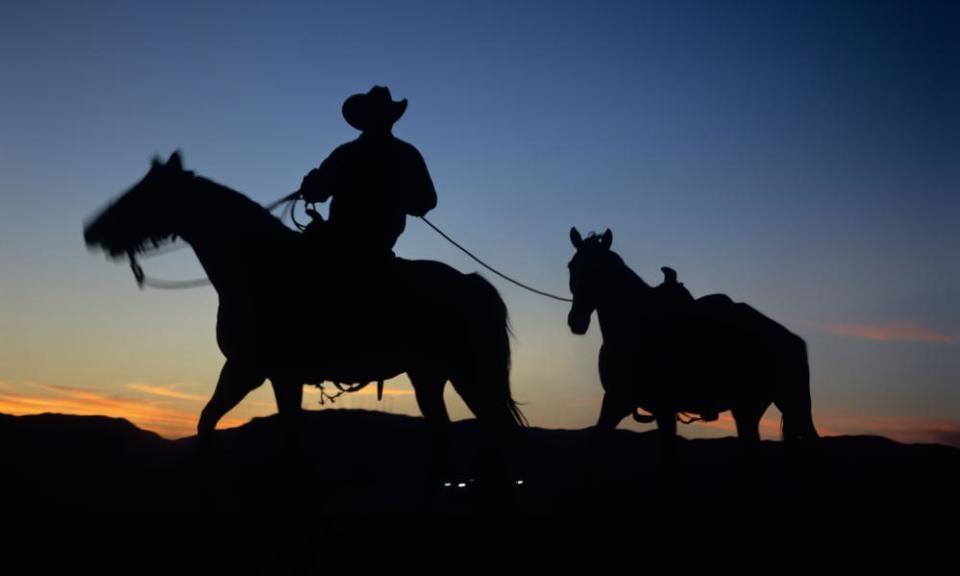My Name Is Yip by Paddy Crewe review – a consummate debut

“‘My name is Yip Tolroy & I am mute. I have made not a sound since the day of my birth, October 2nd, 1815.” So begins Paddy Crewe’s ambitious, cinematic debut novel set during Georgia’s gold rush in a semi-mythic American south that recalls both Cormac McCarthy’s All the Pretty Horses and Faulkner’s Light in August. Purporting to be the written account of Yip’s adventures narrated from the comfort of later life, it explores a society in flux, one about to turn its back on religion and embrace greed and individualism. It’s also a rollicking, page-turning wild west adventure, populated by a cast of arresting grotesques, with luminous imagery and an unforgettable protagonist.
When Yip’s father mysteriously disappears, his fierce, gun-toting mother opens Tolroy’s Store in Heron’s Creek and sets her son to work. At 14, he’s just 4ft tall and hairless, from what we assume to be alopecia. The pain of his mutism is well expressed in affecting arias: “How can a man live without his voice, O this was the question what begun to haunt my every waking & sleeping minute.” His future looks bleak until a retired doctor teaches him to read and gives him a slate on which to write. This single means of communication is the tool that emancipates Yip, one that travels with him through his picaresque adventures after he embarks on a disastrous night expedition prospecting for gold: “I too turned my heart away from God & took a turn down the Road to Ruin.”
Rescued from drowning by the lanky Dud Carter, Yip is forced to leave town when he kills a stranger in a drunken brawl. Thus begins an epic fugitive journey across the American frontier on his trusty horse Gussie, with only Dud for company. It’s here that Crewe’s powers of evoking landscape and character really begin to soar, with Melvillian prose full of striking unexpected phrases. There are compound words (“creekmuck”, “foodstrewn”, “bloodslick”), and scattered coins on a road shining “like the wavetips of the rolling moonstruck ocean”; there are men with “beards ambered with drops of liquor”, and trees “with their old bones & their old bark-rough tongues”, full of the “sump-throated cries” of crows.
Crewe’s powers of evoking landscape and character really soar, with striking unexpected phrases
Later, after Yip is separated from Dud, he’s gathered under the wing of the roguish Jim Coyne, travelling onwards in his wagon. It takes a while to realise he’s been recruited into a freak show, with attractions such as the Pig Faced Lady and queasily sexualised identical twin girls the Living Dolls. Yip is forced to appear in a cage, into which punters pour drink and abuse, only to be rescued once again by Dud. But can Yip get back to Heron’s Creek, claim his gold, avenge his father and be reunited with his mother? These questions make for a tense third act. Here we feel there’s something of Dickens’s orphaned heroes in Yip, a young man who tangles with society’s evils, but has the potential to come good. For Yip read Pip.
Occasionally, the folksy tone veers into self-parody (“These is strange flames, said she, these is strange flames”), and a couple of opportunities to explore the big moral issues of the day – slavery and the treatment of Native Americans – are missed. After Yip is briefly held captive by an escaped slave he eventually sees him and his sister “hanging from the cottonwood … twisting & swaying in the morning breeze”. There’s little further comment on this horrific image. Later, when he encounters the Cherokee Onacona, their relationship is frustratingly short-lived: “The face of the old Indian always seemed to tell a tale I could not read … I hope he was not drove away like many.”
These quibbles aside, My Name Is Yip is a remarkably vivid and energetic debut novel; a consummate linguistic performance made all the more extraordinary by the fact that its author is from Stockton-on-Tees rather than Atlanta, Georgia.
• Jude Cook’s novel Jacob’s Advice is published by Unbound. My Name Is Yip by Paddy Crewe is published by Doubleday (£14.99). To support the Guardian and the Observer buy a copy at guardianbokshop.com. Delivery charges may apply.

 Yahoo Movies
Yahoo Movies 